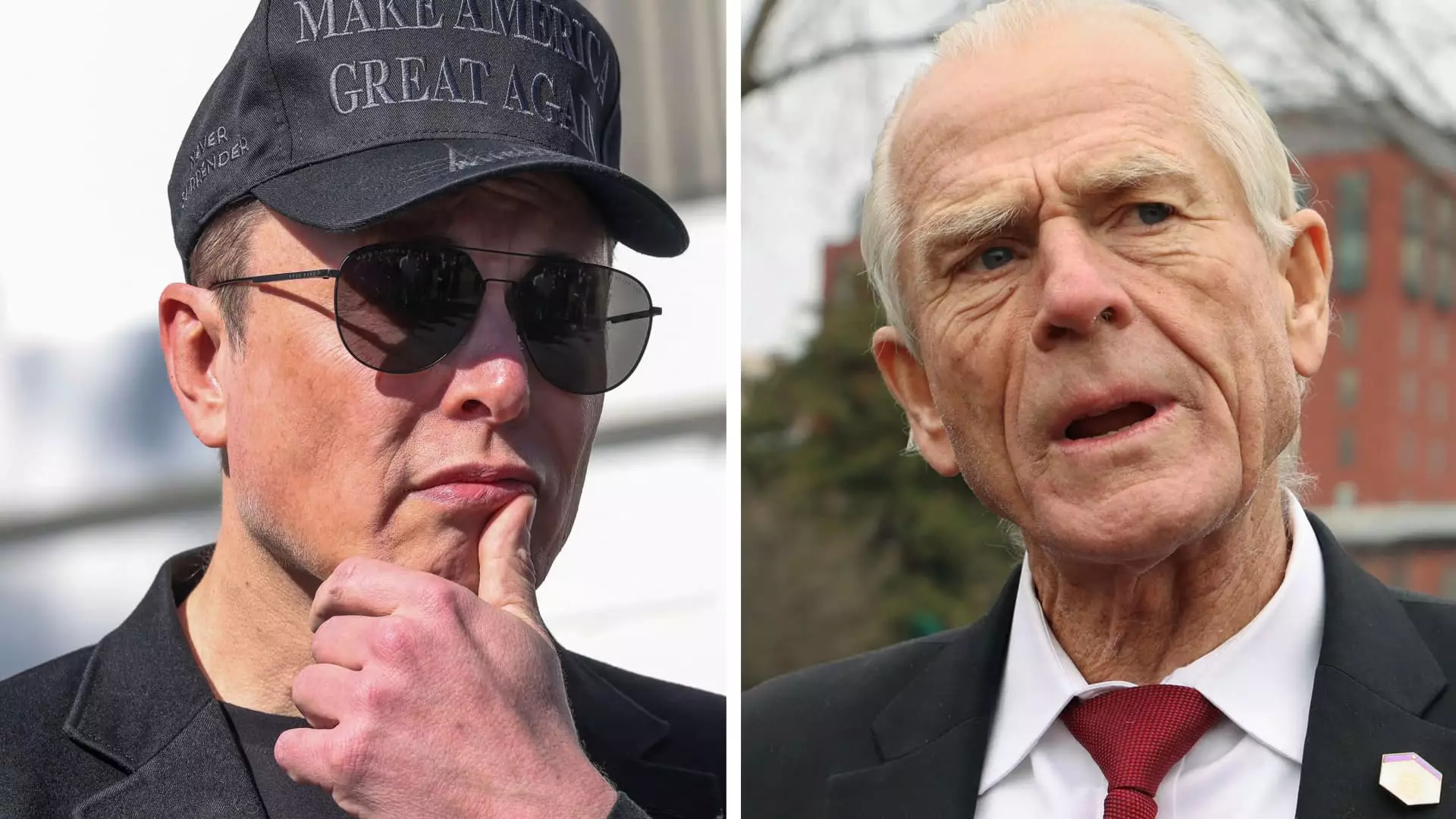In the fast-paced world of tech and automotive innovation, few stories have the capacity to capture attention like that of Tesla and its flamboyant CEO, Elon Musk. Recently, Tesla shares have taken a nosedive, plummeting consecutively over four trading days, creating waves of concern among investors and stakeholders alike. The spectacle took an unusual turn when Musk, known for his bold declarations, unleashed a barrage of criticisms aimed at Peter Navarro, President Donald Trump’s trade advisor. This public spat raises pressing questions about the intersection of trade policy, political influence, and corporate success.
Musk’s social media rants escalated quickly, ripping into Navarro’s academic credentials and questioning the validity of his economic insights. With palpable frustration, Musk tweeted, “a PhD in econ from Harvard is a bad thing, not a good thing,” a remark steeped in sarcasm that implies Navarro’s expertise has done more harm than good. As the week unfolded, Musk took to further invective, labeling Navarro “dumber than a sack of bricks” and even apologizing to bricks—a display of wit that contrasts sharply with the dire situation Tesla finds itself in.
Political Divides within the Administration
What is striking about this unfolding saga is not just Musk’s colorful language but the illuminating window it provides into divisions within the Trump administration regarding trade policy. The tariffs on more than 180 nations announced last week sparked debates that necessitated an examination of existing alliances and economic strategies. During a subsequent press briefing, White House spokesperson Karoline Leavitt attempted to downplay the situation, noting that these were merely two individuals with divergent views. Nevertheless, the public quarrel signifies a growing tension among key figures within the government, challenging the narrative of a unified front.
Musk’s remarks take on added importance as they echo the growing frustration not only within the tech sector but also from corporate giants who find themselves navigating the choppy waters of skyrocketing production costs due to import tariffs. Despite analysts proclaiming that Tesla could more easily withstand tariff pressures than its competitors—because of its U.S.-based assembly—production costs for materials and parts sourced from abroad are anticipated to rise. The stakes are high as Canada and Mexico, critical suppliers of steel and aluminum, remain vulnerable amidst the unpredictable trade landscape.
Elon Musk’s Vision vs. Trump’s Policies
Compounding these challenges is Musk’s bold vision for trade relations. During an event that garnered international attention, Musk advocated for a zero-tariff approach between Europe and North America, underscoring a stark ideological divergence from the current leadership’s heavy-handed tariff strategy. His call for a free trade zone reveals a strategic calculus rooted in business interests that transcend national borders—a refreshing perspective, perhaps, but one fraught with political peril in the prevailing climate.
The importance of Europe to Tesla cannot be overstated. With a groundbreaking factory near Berlin and SpaceX’s collaborative ventures in the region, Musk’s financial fortunes are also deeply entwined with the dynamics of European trade relations. Yet, as the climate for making critical business decisions becomes increasingly fraught, the crippling implications of the past few months are already evident. Tesla suffered a staggering 13% decline in deliveries in the last quarter—a statistic that stirred up discontent among investors and analysts, manifesting in the slide of Tesla’s stock price amid a tumultuous market.
The Broader Implications for the Economy and Musk’s Influence
The events surrounding Musk and Navarro reveal broader implications for the economy, as changing trade policies can significantly influence company outlooks and viability. Musk is not just a corporate leader; his political engagement and understanding of governmental efficiency have fostered reactions that reverberate through public sentiment and financial markets alike. Critics argue that his ventures into politics dampen Tesla’s public image, stoking protests and boycotts that impact the brand’s loyalty.
Musk’s dual roles as a business innovator and outspoken political figure place him at the crossroads of technology, commerce, and governance, where his actions can have ripple effects far beyond the world of electric vehicles. The current scenario carries lessons about the volatile blend of politics and commerce, emphasizing how personal rivalries and public disputes can reshape the landscape of economic policy. As uncertainty looms in the horizon, it remains to be seen whether Musk’s powerful voice can recalibrate perceptions around Tesla and its future in a world increasingly defined by discordant trade landscapes.


Leave a Reply